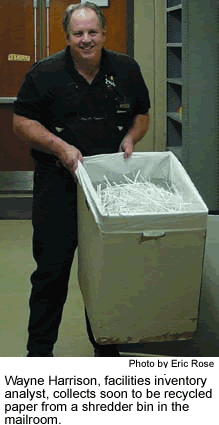
 |
|||
Inside November 12, 2002 Issue
Government's New
Tricks
(Editorial)
Recycling at FC not what it used to be
By Eric Rose
Staff Writer
 It
seems that the Georgia Highlands College recycling program is not being executed with
the same enthusiasm that it had at its start.
It
seems that the Georgia Highlands College recycling program is not being executed with
the same enthusiasm that it had at its start.
In 1992 FC's recycling project won second place in the Georgia Recyclers
of the Year Contest and also received a certificate of achievement from
a national recycling organization.
Georgia Highlands College students and staff members started the current recycling
program in 1991. Among them were Lynn Mills (staff), Marta Turner (student)
and Harold Pressley (then director of Plant Operations). Turner went on
to head the Rome Floyd Recycling Center.
Facilities inventory analyst Wayne Harrison said of the program, "They
used to do a good recycling job here, but now it's dwindled." Harrison
works at Plant Operations, which undertook the program.
The University System of Georgia maintains policy pertaining to recycling
for all schools to follow. "We have been doing this (recycling) from
a state standpoint for at least five years," said FC president, Dr.
Randy Pierce. "As good stewards we need a good recycling program
and policy toward it," he said.
According to Pierce, FC is following state procedure. "I walk in
the halls and see the recycle bins and the cans, and I see that we are
recycling," he said.
FC currently recycles cardboard, white background paper and aluminum cans.
The custodians empty the bins and collect their contents. The grounds
people then take the material to Plant Operations, where it is picked
up by the Rome Floyd Recycling Center every two weeks.
The bins with the holes in the top are for aluminum cans. The blue bins
in the classrooms are for paper. Cardboard is gathered and compressed
into bales by a baling machine on the bookstore's loading dock.
Paper recycling has been reduced because FC has stopped recycling computer
paper. When asked about who brings the paper to Plant Operations for recycling,
Harrison said, "Somebody does. I haven't seen them come down here
in a while."
The Beautiful Bartow Program takes care of recycling at the Cartersville
site. "They come and pick up our plastic and recycled paper,"
said Cartersville site director, Carolyn Parks. "Beyond that we really
don't have anything to do with it," she said. She also said that
Bartow County is "very serious about recycling."
Plastics are not currently recycled by Georgia Highlands College. "We have not
had enough (plastic) to accumulate anyplace," said Doug Webb, director
of Plant Operations. "At one point in time we tried to do that,"
he said. He added that the materials currently recycled are "the
only recyclable products of any quantity."
Turner offered a different opinion. "I don't know if they expect
the program to pay for itself," she said. "It might not be a
profit maker." Turner speculated that plastic, particularly drink
bottles, is a prevalent commodity on campus.
Turner suggested that students take the responsibility of starting the
program to recycle plastic bottles and conduct a waste audit.
According to Turner, a waste audit involves analyzing the contents of
several waste containers over a period of time and recording the percentages
of each commodity present. She suggested that the students show their
results to Plant Operations. "The proof is in the pudding,"
she said.
Turner also suggested that the college seek out a grant to cover the expense
of starting a plastics program. She said that there are several grants
(both state and national) available, but that they have already been awarded
for the year. She said that the grants would be available for the fall
of next year, however.
One aspect of the program that would be beneficial would be a reduction
in waste. Harrison says that the custodians are reporting more garbage
and that the garbage trucks come more often.
Turner said that a plastics program would reduce the amount of waste,
making garbage pickups fewer. Turner feels that a plastics program would
help to reduce costs in the end.
The current plan would have to be modified in order to accommodate the
pickup of plastics. Plastics receptacles would be needed, as well as a
separate bin for the storage of the accumulated plastic.
The same baler that compacts the cardboard into bales can be used to compact
the plastic and the same truck that transports the recycled paper can
pick it up, according to Turner. "There would be some expense involved,"
she said.
Turner said that many things could be done with the plastic collected.
"We send it to two different local mills that make carpet out of
it," she said.
Expansion of the recycling program is not currently being discussed by
the administration. "It hasn't come up at any of our cabinet meetings.
My guess is that right now what we're doing is meeting the need,"
said Pierce.
| Front Page | News | Editorials | Opinions | Happy Holidays | Features | Sports |
| Entertainment
| Campus Life | Archives
| Our Staff | Application
| History |
| F.A.Q.'s |
![]()
Floyd College - Rome, GA, USA - The University System of Georgia
Copyright © 2002 Georgia Highlands College, All Rights Reserved.